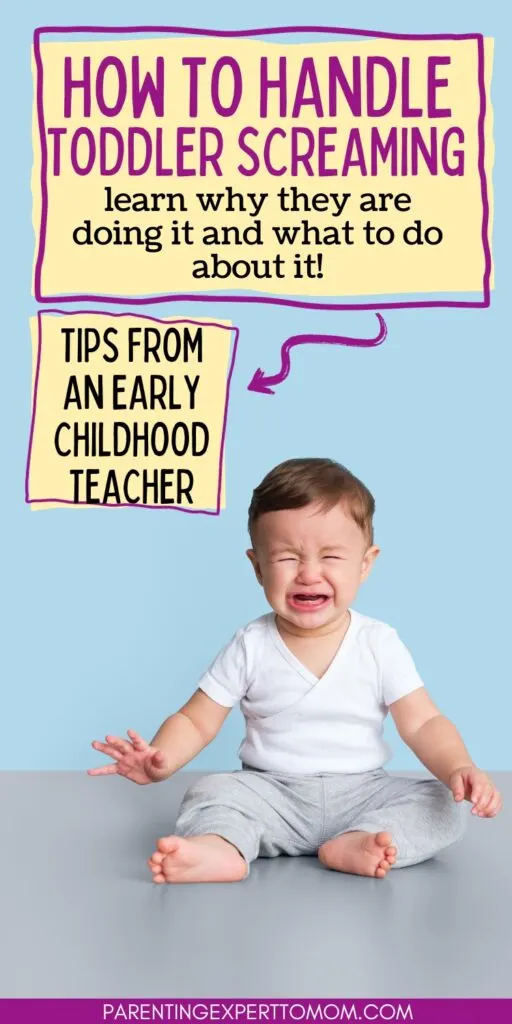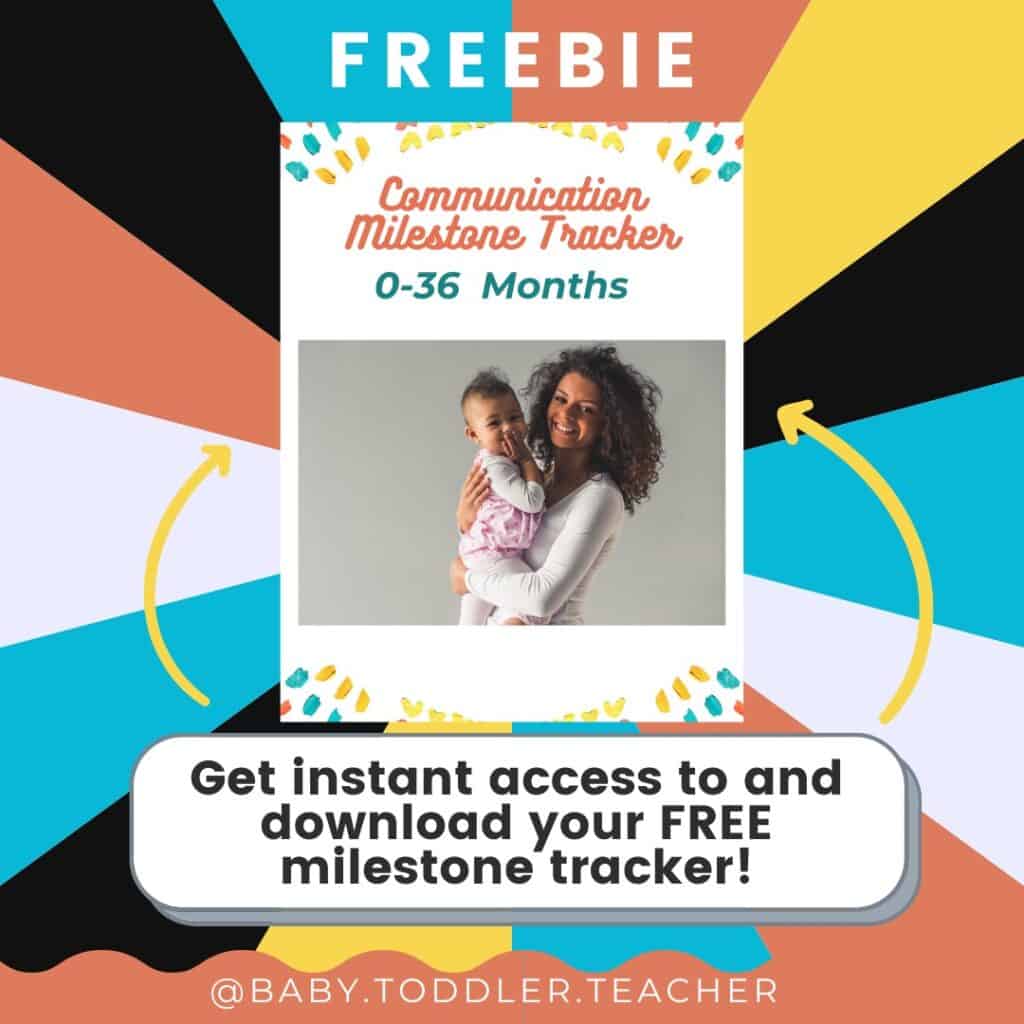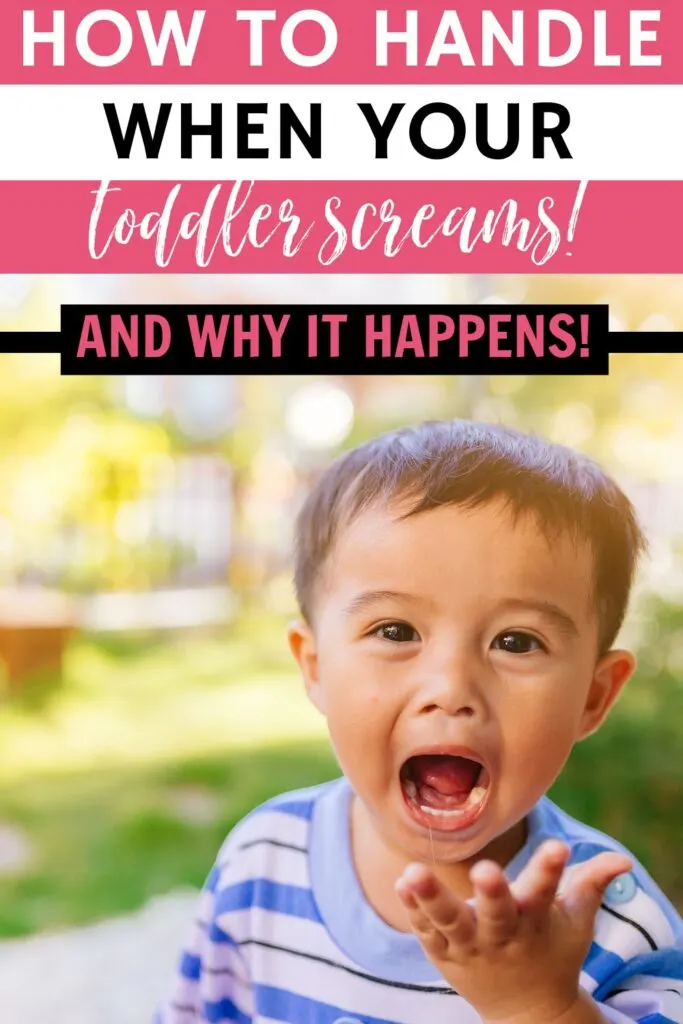It’s happened to all of us.
You’re in a public place and suddenly you hear a screaming toddler.
They seem to be yelling at the top of their lungs, and everyone’s looking.
You might ask, “Why do young children do this and how can we handle it?”
Well, you’re in the right place!
In this blog post, we’ll dig into the reasons why toddlers might scream and share some handy tips on how to deal with this loud behavior.
So, let’s start our journey to understanding and managing our little ones better!

(This post may contain affiliate links. To read our full disclosure policy click here.)
Why Do Toddlers Scream?
Toddlers scream for a bunch of reasons.
One of the main reasons is that they have limited communication skills.
This means toddlers can’t tell us what they want or need in words, so they yell instead.
Another reason is that a toddler’s brain is still growing.
This can sometimes lead to poor impulse control.
In simpler terms, this means that toddlers might scream because, at the moment, they don’t know any other way to express themselves.
Also, toddlers are still learning how to handle their feelings.
They don’t quite know how to regulate their emotions or control their feelings, which can lead to screaming fits or toddler tantrums.
And guess what?
Sometimes, being loud can be fun for them!
So, if you see your child screaming at the top of their lungs, they might just be having a good time!
The good news is, that screaming is just a phase most toddlers go through.
It’s not necessarily a sign of bad behavior.
As your child’s communication skills get better and they learn more about their feelings, the screaming phase should become less intense.
Remember, understanding your child’s needs and helping them through their emotional development is a big part of parenting.
So, next time your toddler starts screaming, remember these reasons and try to guide them through it!

What to do When Screaming Episodes Happen
When a toddler screams, it’s important to not get too upset.
Remember, they might be trying to tell you something – maybe they’re sleepy, hungry, or just bored.
This is where good communication comes into play.
Here’s a trick – try becoming a detective!
See if you can figure out what’s making your little one scream.
Are they tired?
Hungry?
Or maybe they just want to play?
Once you figure out the reason, you can help them feel better.
For example, if they’re hungry, give them a snack.
If they’re bored, read them a story or play a game with them… by the way, it is ok to let your little one be a bit bored every now and then…but that is another blog post!
Sometimes, toddlers scream just because it’s fun to be loud!
When this happens, you can teach them about “inside voice” and “outside voice”.
Tell them that it’s okay to be loud when they’re outside, but when they’re inside, they need to use their “inside voice” which is softer and quieter.
Be patient as this takes a long time to learn and understand!
Keep Your Cool When Your Toddler Screams
It’s really important to keep a calm demeanor when your little one starts screaming.
Remember, they are still learning about their feelings and how to control them.
And guess what?
They often look at us to learn how to behave.
Imagine how you often match your friend’s excitement when they tell you good news.
It’s the same with toddlers, if we get loud and upset, they likely will too.
So what can you do?
First, take a deep breath.
It can help you stay relaxed.
Try to remember that your toddler isn’t screaming to upset you.
They might be hungry, tired, or just want your attention.
Once you’ve taken that deep breath, think about what your little one needs.
You should also show them how to handle their own emotions.
You might use a stuffed animal to help.
For example, if they’re upset, you can hug the stuffed animal and show how it helps calm you down.
This visual might help your toddler understand that they can also cuddle their stuffed animal to feel better.
Remember, we all get upset sometimes, even adults.
And that’s okay.
By staying calm and understanding, you are teaching your toddler a very valuable lesson about managing emotions.

Handling Your Toddler’s Screams in Public Places
Dealing with your child’s screams can be a hard time, especially when you’re in public places like the grocery store or noisy restaurants.
It’s important to remember that this is totally normal—toddler screams are part of how they grow and learn.
Try to remember this is typical development and it does not make you a “bad parent” if your child is screaming out in public!
Sometimes, places with lots of people and noise can cause a “sensory overload” for your little one.
This is when all the sights, sounds, and smells become too much and they don’t know how to deal with it.
A difficult situation like this might make your child scream even more.
But, you can help them!
When your child screams, try to stay cool and calm.
Look for signs to see if they’re hungry, tired, or just need a hug.
Maybe they’re upset because the grocery store is too noisy.
If that’s the case, you could step outside for a bit where it’s quieter.
Remember, you’re not alone.
All parents have been through this, and it’s just a part of helping your child grow up.

Offer Support During Temper Tantrums
Temper tantrums can sometimes lead to loud angry outbursts, like screaming.
It’s important to remember that when our little ones have strong feelings, they might not know how to handle them (get more tantrum tips here.)
This can make them feel upset and they may start a tantrum.
Instead of trying to stop the tantrum, it’s best to offer emotional support.
When your child is upset, use simple words to talk to them.
Say things like, “I can see that you’re upset,” or “It’s okay to feel angry.”
This can help them understand their feelings better.
Always stay calm when this happens.
If we become upset too, it might make them feel more upset!
Remember, it’s okay to feel strong feelings and it’s okay to feel upset.
We can help our little ones by comforting them when they’re upset.
We can hug them, hold their hand, or just sit with them until they feel better.
It’s important to validate their emotions.
By validating, we’re saying that it’s okay to feel the way they do.
By doing this, we’re teaching them how to handle strong feelings calmly and healthily.
Developing Early Communication Skills to Minimize Screams
You might wonder, “Why is my toddler screaming so much?”
One big reason is that they still are learning how to talk.
This means they might not have the words to tell us how they feel or what they want.
When they can’t express their needs, sometimes they scream.
But don’t worry!
We can help our little ones learn to talk better, so they won’t need to scream so much.
A fun and effective way to do this is through play and our usual daily routines.
For example, during playtime, you can simply narrate what your child is doing (get more simple ideas here.)
This can help our toddlers learn single words.
They need to hear words over and over again to learn them and this is a simple way to make that happen.
Another helpful tool we can use is baby sign language.
Simple signs like “more,” “eat,” “drink,” or “sleep” can help our toddlers tell us what they need without screaming.
Remember, every little word your toddler learns is a big step for them.
And over time, these steps can lead to fewer toddler screams, making everyone happier at home!

Let Your Toddler Explore the Power of Their Voice!
Sometimes, your toddler’s volume might go up because they discover how much fun it can be to be loud!
They start to understand that their voice is a powerful tool that they control.
And guess what, it’s completely normal and even a fun part of growing up.
Playing with the loudness and quietness of sounds can be an exciting adventure.
One of the best ways to do this is through playtime with musical instruments.
Beating a drum loudly or softly, blowing a whistle, or shaking a tambourine can help kids understand and control the volume of the sounds they make.
Giving your toddler a chance to be loud can be as simple as letting them sing at the top of their lungs during outdoor playtime or in a certain room in your house where being loud won’t disturb others.
This way, they learn that there are suitable times and places to explore their loud voice.
You can also teach them about the beauty of a quiet voice.
Show them how whispering can be just as fun and powerful as being loud.
Reading a book together can be a perfect time to practice using a quiet voice.
Through these activities, your child learns to balance between a loud voice that expresses joy and excitement, and a quiet voice used during quiet times or when expressing calmness and peace.
Remember, every shout of glee or whisper of a secret is your toddler exploring the power of their voice!
Hang in there!
Toddler screams might be loud and hard for us to understand, but remember, it’s just a part of them growing up.
It can happen for lots of different reasons like they’re upset, hungry, tired, or just because they’re having fun discovering their voice.
This is normal. It’s part of the toddler stage.
It can be challenging, but by being patient and kind, we can find out why they’re screaming.
Then, we can find better ways to help them feel better and use their words or signs instead of screams.
This is how we can make sure we’re ready for the next time they feel upset.
By doing this, we’re teaching them effective communication.
Remember, even though a screaming child can be stressful, you’re doing a great job, and each day your little one is learning and growing!
Frequently Asked Questions about Toddler Screaming
It’s important to understand that toddlers often scream because they are still developing their communication skills and may not have the words to express themselves properly. Instead of trying to stop the screaming, try to identify the reason behind it and address it accordingly. This could mean providing emotional support, validating their feelings, or finding a way for them to communicate without screaming, such as through baby sign language.
Yes, it is completely normal for toddlers to scream. It is a part of their development as they learn about their voice and how to express themselves. However, if your child’s screaming seems excessive or uncontrollable, it may be worth discussing with your child’s pediatrician.
Toddlers may go through a phase where they scream more often, but every child is different. It’s important to remember that it is a normal part of their development and with patience and understanding, it can be managed in a positive way.
It’s natural for us as parents to become upset or frustrated when our child is screaming. But it’s important to remember that our children look to us for guidance on how to handle their emotions. If we remain calm and respond with reassurance and validation, it helps our little ones learn how to handle strong feelings in a healthy way. Taking deep breaths or stepping away for a minute or two can be helpful.
Related Posts You Will Enjoy
Complete Guide to the Best Toddler Climbers in 2023
Easy Ideas to Entertain Your Busy Toddler at Home
Toddler Hates Getting Dressed? Try this!
What to do if Your Toddler is Throwing Food


Kayla O’Neill has a master’s degree in education as well as a bachelor’s degree in special education with an emphasis in early childhood education. She has been working as a developmental therapist with babies and toddlers in early intervention since 2012. She is also a mom with two young children.
